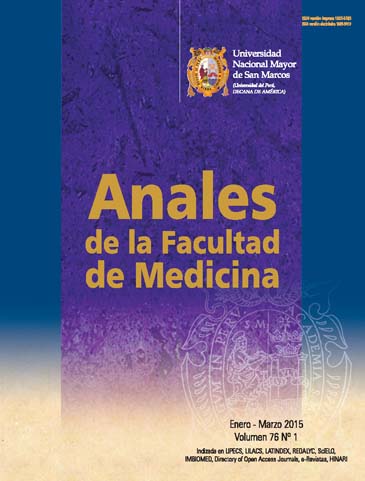Bases and Latin American Perspectives on Medicine and Health Centered Person
DOI:
https://doi.org/10.15381/anales.v76i1.11077Keywords:
Person-centered Medicine, care and health policy, education and health researchAbstract
Background: This article emerges as part of a process led by the National Academy of Medicine of Peru closely with other Latin American Academies of Medicine, and major universities and health-related professionals. Objective: To describe and substantiate the importance of the Person Centered Medicine (CCM) in the Latin American context. Methodology: Review articles and Latin American experiences on the subject, engaging in academic meetings to discuss related content, two preliminary in Lima in December 2013 and January 2014, third in Buenos Aires, regarding the 2nd International Congress of Medicine Centered Person with the presence of the Academies of Medicine, Argentina, Bolivia, Chile and Peru (November 2014) and fourth in Lima, Meeting of the Academy of Medicine of Bolivia, Colombia, Chile, Paraguay and Peru (December 2014). Results: historical and contemporary, universal and local precedents relevant to the conception and development of a re-prioritization of medicine around the person and context, articulating for science and humanism are pointed effect. Philosophical concept level person in medicine is discussed, including terminology, historical bases, and human rights. On this basis the evolution of the central concepts of the MCP is examined, highlighting their relevance in both clinical medicine and public health, care, education and research and health policy. With respect to clinical practice and education, the notion of MCP as a fundamental strategic principle, its programmatic educational applications, and possible institutionalization level medical schools arises. The importance of training in ethics and clinical communication and appropriate use of technology and scientific evidence at the service of the person is highlighted. Institutional possibilities available for inter-disciplinary education of health professionals and Latin American educational perspectives are included. The importance of scientific research on the MCP, encompassing studies of conceptualization, measurement and diagnostics including the need for complementary narrative stands instruments. Finally, consider perspectives on health policy focused on the individual and the community as well as input and recommendations derived from the Latin American experience in this area. Conclusions: Person Centered Medicine assesses the biological, psychological and socio-cultural developments and processes within the framework of the whole person, articulating science as an essential tool and humanism as the essence of medicine. Against reductionist epistemological formulations, MCP proposes a medicine informed by evidence and experience-oriented and whole person.Downloads
Published
2015-03-31
Issue
Section
Revisiones
License
Copyright (c) 2015 Patrick Wagner, Alberto Perales, Rodolfo Armas, Oscar Codas, Raúl De los Santos, Daniel Elio Calvo, Juan Mendoza Vega, Melitón Arce, José Luis Calderón, Lucía Llosa, Javier Saavedra, Oscar Ugarte, Herman Vildózola, Juan Enrique Mezzich

This work is licensed under a Creative Commons Attribution-NonCommercial-ShareAlike 4.0 International License.
Those authors who have publications with this magazine accept the following terms:
- Authors will retain their copyrights and guarantee the journal the right of first publication of their work, which will be simultaneously subject to Creative Commons Attribution License that allows third parties to share the work as long as its author and its first publication this magazine are indicated.
- Authors may adopt other non-exclusive licensing agreements for the distribution of the version of the published work (eg, deposit it in an institutional electronic file or publish it in a monographic volume) provided that the initial publication in this magazine is indicated.
- Authors are allowed and recommended to disseminate their work over the Internet (eg: in institutional telematic archives or on their website) before and during the submission process, which It can produce interesting exchanges and increase quotes from the published work. (See El efecto del acceso abierto ).
How to Cite
1.
Wagner P, Perales A, Armas R, Codas O, De los Santos R, Elio Calvo D, et al. Bases and Latin American Perspectives on Medicine and Health Centered Person. An Fac med [Internet]. 2015 Mar. 31 [cited 2025 Jun. 4];76(1):63-70. Available from: https://revistasinvestigacion.unmsm.edu.pe/index.php/anales/article/view/11077



